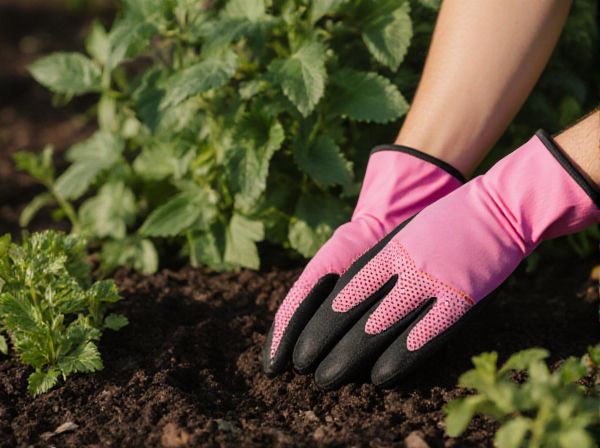
Fine mulch vs coarse mulch Illustration
Fine mulch breaks down more quickly, enriching soil faster by releasing nutrients and improving moisture retention. Coarse mulch provides better aeration, reduces soil compaction, and offers long-lasting protection against weeds and erosion. Choosing between fine and coarse mulch depends on your garden's specific needs for nutrient release speed and soil structure maintenance.
Table of Comparison
| Feature | Fine Mulch | Coarse Mulch |
|---|---|---|
| Texture | Small, soft particles | Large, chunky pieces |
| Water Retention | High, retains moisture well | Moderate, drains faster |
| Weed Control | Excellent, forms dense layer | Good, gaps can allow weeds |
| Decomposition Rate | Fast, adds nutrients quickly | Slow, longer-lasting |
| Aesthetic | Smooth, uniform appearance | Rustic, natural look |
| Best Use | Flower beds, vegetable gardens | Pathways, around trees and shrubs |
Understanding Fine Mulch and Coarse Mulch
Fine mulch consists of small, shredded organic materials that decompose quickly, enriching soil nutrients and improving moisture retention. Coarse mulch is made up of larger wood chips or bark pieces that provide effective weed suppression and better aeration while breaking down more slowly. Selecting between fine and coarse mulch depends on specific garden goals such as nutrient cycling, soil health, or weed control.
Key Differences Between Fine and Coarse Mulch
Fine mulch consists of smaller, finely shredded materials that decompose faster, enriching soil nutrients more quickly and providing a smoother, more uniform appearance. Coarse mulch contains larger pieces such as wood chips or bark, offering better aeration, longer-lasting moisture retention, and improved weed control due to its slower breakdown. Key differences between fine and coarse mulch include decomposition rate, texture, and impact on soil aeration and moisture management.
Benefits of Using Fine Mulch in Gardens
Fine mulch promotes better soil moisture retention and improves soil texture by breaking down quickly and enriching the soil with organic matter. Its smaller particles create a smooth, even layer that suppresses weeds more effectively than coarse mulch. This type of mulch also facilitates easier nutrient absorption and supports healthier root development in garden plants.
Advantages of Coarse Mulch for Landscaping
Coarse mulch offers superior aeration and improved water drainage, promoting healthier root systems in landscaping applications. Its durability reduces the frequency of replacement, providing long-lasting ground cover that resists compaction and erosion. Additionally, coarse mulch helps moderate soil temperature effectively, creating an optimal environment for plant growth while suppressing weed development.
Moisture Retention: Fine vs. Coarse Mulch
Fine mulch retains moisture more effectively than coarse mulch due to its smaller particle size, which reduces evaporation and maintains consistent soil hydration. Coarse mulch, with its larger particles and greater air gaps, allows for faster drainage and less moisture retention, making it ideal for plants needing well-drained soil. Gardeners choose fine mulch for moisture-sensitive plants and coarse mulch for those tolerating drier conditions.
Weed Suppression Effectiveness Compared
Fine mulch provides superior weed suppression effectiveness due to its denser coverage and smaller particle size, which limits sunlight penetration and inhibits weed seed germination more efficiently than coarse mulch. Coarse mulch, while better for aeration and water drainage, creates gaps that allow weeds to establish. Choosing fine mulch can significantly reduce weed growth, minimizing the need for manual weeding or herbicide application in garden beds.
Impact on Soil Health and Structure
Fine mulch improves soil health by breaking down quickly, enriching the soil with organic matter and enhancing nutrient availability for plants. Coarse mulch decomposes slower, contributing to better soil aeration and water infiltration, which supports robust root development and microbial activity. Combining both mulch types can optimize soil structure, balancing moisture retention and air circulation for sustainable garden growth.
Best Applications for Fine and Coarse Mulch
Fine mulch, composed of small, shredded materials, excels at conserving soil moisture and suppressing weed growth in flower beds and vegetable gardens. Coarse mulch, made from larger wood chips or bark, improves soil aeration and provides long-lasting coverage, making it ideal for pathways and around trees. Selecting coarse mulch for high-traffic areas reduces compaction, while fine mulch enhances nutrient availability for shallow-rooted plants.
Longevity and Maintenance Requirements
Fine mulch decomposes faster, enriching soil nutrients but necessitating more frequent replacement to maintain effectiveness. Coarse mulch, with larger particles like bark chips, lasts longer by resisting rapid breakdown and requires less frequent replenishment. Choosing between fine and coarse mulch depends on balancing soil improvement goals with the desired maintenance interval.
Choosing the Right Mulch for Your Garden
Fine mulch decomposes faster, enriching the soil quickly and improving nutrient availability for plants, making it ideal for vegetable gardens and flower beds. Coarse mulch lasts longer, provides better aeration, and is effective at suppressing weeds in shrub borders and around trees. Selecting the right mulch depends on your garden's specific needs, soil type, and plant preferences to balance moisture retention and soil health.
Fine mulch vs coarse mulch Infographic

 gardendif.com
gardendif.com